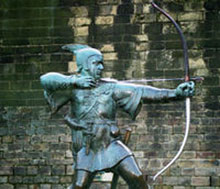|
大英雄“羅賓漢”
[ 2007-02-09 16:17 ]
 Robin Hood is the archetypal English folk hero; a courteous, pious and swashbuckling outlaw of the medi?val era who, in modern versions of the legend, is famous for robbing the rich to feed the poor and fighting against injustice and tyranny. He operates with his "seven score" (140 strong) group of fellow outlawed yeomen – named the Merry Men, in the obsolete sense of "companion or follower of an… outlaw". He and his band are usually associated with Sherwood Forest, Nottinghamshire. Robin Hood is the archetypal English folk hero; a courteous, pious and swashbuckling outlaw of the medi?val era who, in modern versions of the legend, is famous for robbing the rich to feed the poor and fighting against injustice and tyranny. He operates with his "seven score" (140 strong) group of fellow outlawed yeomen – named the Merry Men, in the obsolete sense of "companion or follower of an… outlaw". He and his band are usually associated with Sherwood Forest, Nottinghamshire.
In many stories Robin's nemesis is the despotic Sheriff of Nottingham. The sheriff gravely abuses his position, appropriating land, levying intolerable taxation, and unfairly persecuting the poor. In some tales the antagonist is Prince John, based on John of England, seen as the unjust usurper of his pious brother Richard. In some versions Robin Hood is said to have been a nobleman, the earl of Loxley, who was deprived of his lands by greedy churchmen. Sometimes he has served in the crusades, returning to England to find his lands pillaged by the dastardly sheriff. In some tales he is the champion of the people, fighting against corrupt officials and the oppressive order that protects them. In others he is an arrogant and headstrong rebel, who delights in bloodshed, cruelly slaughtering and beheading his victims.
In fact, the Robin Hood stories have been different in every period of their history. Robin himself is continually reshaped and redrawn, made to fit whatever values are pushed on to him. This fact makes any notion of a "real" or "true" Robin Hood largely redundant. Even if a historical Robin Hood could be identified, he could account for only the bare minimum of the rich legend surrounding his name. The figure is less a personage and more a palimpsest of the various ideas his "life" has been made to support.
Starting in 2007, the University of Nottingham will be offering a Masters degree on the subject of Robin Hood
羅賓漢是一位典型的英格蘭民間英雄。他生活在中世紀(jì),彬彬有禮,是一位虔誠而有俠義之氣的在逃犯人。然而在現(xiàn)代故事的多種版本里,他卻是以伸張正義、打抱不平、救濟(jì)窮人而著稱。他所帶領(lǐng)的“七分團(tuán)”全是由被政府判罪了的農(nóng)民組成。在許多傳說中他和他的團(tuán)隊(duì)常常和諾丁漢郡的舍伍德打交道。
在許多故事中羅賓漢的對手便是專橫的諾丁漢郡長。這個貪婪的郡長濫用職權(quán)、強(qiáng)占土地、征收重稅、迫害窮人,而在另一些故事里,羅賓漢的對手又變成了篡奪自己兄弟王位的約翰王子。在其它的版本中,羅賓漢被描述成一位貴族-洛克斯里伯爵,被貪婪的教會掠奪了土地。甚至有故事說他是十字軍中的一員。還有一些傳說,說他是人民的衛(wèi)士,與腐敗的官僚階級以及偏袒這些官僚的制度做勇敢的斗爭。還有一些故事中,他卻是個傲慢無禮、血腥殘忍的強(qiáng)盜,殘酷殺害俘虜。
其實(shí)關(guān)于羅賓漢的傳說在每個時期都有所不同。羅賓漢這個任務(wù)被不斷的重新塑造使其更加適合于各個時期人民的心理需求。這一事實(shí)告訴我們尋找“真實(shí)”或“真正”的羅賓漢是沒有什么意義的。即使是找到了歷史上真有這樣的一個羅賓漢,那么他能做的也只是所有傳奇中微不足道的一小部分。羅賓漢這一形象已經(jīng)不局限在一個人的身上了,更多的是經(jīng)過重新塑造帶有讀者各種個人理想色彩的人物。
基于多年來人們對羅賓漢的興趣不減,并且從研究羅賓漢身上可以找到英國歷史的發(fā)展軌跡,從2007年開始,諾丁漢大學(xué)將對羅賓漢這一人物的研究開設(shè)了博士學(xué)位。
點(diǎn)擊查看本頻道更多精彩內(nèi)容
|